


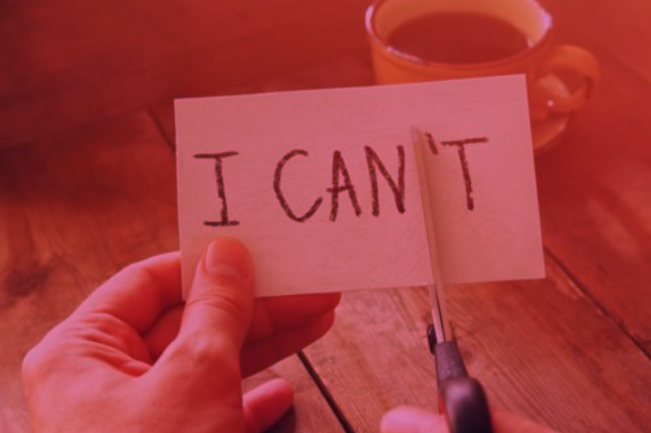
If I had advice for my sixteen-year-old self it’d be this: Stock up on toilet paper and hand sanitizer- you’ll be a millionaire in a couple of years.
No really, I would tell her the power of having confidence in herself. For her, it was a constant need to mix well with everyone. What are their wants? What are their needs? Never taking a second for herself in fear that it would displease others, I can think of distinct moments where I would freeze up mid-sentence just because I thought I would sound stupid. The older I got the more I realized that unless I wanted my back to become a carpet permanently I would need to pamper and understand myself more fundamentally. What are my wants? What are my needs?
So since the clock is only moving forward, how about instead of giving some advice to a sixteen-year-old me, I give it to you? Cool? Cool.
You don’t need to be a prodigy or have a doctorate to be considered smart. Surprised? Probably not, it is perfectly normal to be clueless when you start out on a new passion or career. That could be learning a new instrument, crafting, even learning how to solder. If you have aspirations to work in a recording studio, for instance, you don’t need to do every job. Monitoring engineers, audio technicians, booking, event planners – they all have a role to play. In larger settings some studios have people just to tune the instruments, someone, only to track, and someone only to mix. Smaller settings may have people doubling up jobs, so the tracking engineer might also be the mix or master engineer for that studio. Learning is always power in any setting, and while you don’t need to do every job it can help to not pigeonhole yourself into only one thing you can do. For our studio example, say you get hired on for mastering tracks for commercial use. If the person tracking a session cancels at the last minute or is running significantly late and you know how to track, not only does it make your wallet happy but you distinguish yourself as an asset. You show how valuable you are and if the client hits it off with you they may go on to recommend you to other studios and projects.
In short, you don’t need to do everything, but by learning how things line up and work together you will be able to expand yourself and only develop in your career or hobby. Remember that you are learning, and learning different and innovative ways to do things is one way to set up success for yourself down the line.
The stigma around asking for help is ridiculous. Saying you need help doesn’t mean you are not valuable, tying into the learning part, you are still learning. You don’t need to know how to do everything, if you need something ask for help.
Trust me, I understand the human factor of this. Here you are getting a chance to go after your dreams, you’re in a room with tons of professionals with likely high-end names in their portfolios. Say, move, do anything and that’s it! It can be mind-numbing, anxiety-inducing, all, and any other
synonyms to describe how terrifying it can be. I want to say this next part with love, not asking for help when you’re stuck should be more terrifying. The last thing a professional producer, engineer, or showrunner will want is you slowing down a production. If you don’t know a key cut in the DAW that the studio has, ask. It will not only help the production of what you are doing go smoothly but you also learn how to do it.
If you risk not asking you might leave a bad impression (the thing you tried to avoid) because you could patch a signal wrong, not cue the light at the moment needed in a live production, fry a wire, etc. Assume anything and everything can go wrong if you don’t know something, it could save your employer time and money.
The global music industry is over twenty-one billion US dollars. Anyone that says working in the music industry is not a financially smart idea simply does not understand the huge caliber of this number. I know many friends from high school and a couple from college that loved to do music but kept being told no due to family or financial scares. So some of them went on to become teachers, one went on to work as a bank teller and that was that. In a “normal” job most retire the day they turn 62, in the music industry established artists and mixers don’t retire unless by choice or health concerns. So it makes sense that finding a job in this field can be daunting to say the least, but that’s okay. What makes you different from everyone going after the title of Madonna or the next DJ Khaled is that you are willing to put in the work.
Trust me, you are worth it. The moment you start to see that these intimating numbers and faces are just people that put in as much as you are now, that is the moment you understand confidence. Confidence is knowing that everyone is subject to human error and success. It means you are capable and value yourself and your capabilities.
Have the drive, the rest will steer itself.

While pop music isn’t necessarily my go-to listening choice, it’s ever-present as an underlying soundtrack to our lives, marking the milestones we’re often unaware of until they’ve passed. Sometimes it’s not necessarily the music, but the personal stories that mark these moments. This is apparent when following the unfolding legal battle of Britney Spears, which in a nutshell has been an eye-opening story of the exploitation and suffering of a woman who at almost 40 years old, is under the control of her previously alcoholic, absent father.
Reflecting back on her public 2007 breakdown, I remember how I couldn’t have hummed any of her recent tracks, but her freshly shaven head was looking at me from every shelf in every shop, from trashy mag to ‘newsworthy’ rag. The world laughed and reveled in watching the downfall of a young, successful woman who was most likely battling post-partum depression at the very least. After years of media hounding and criticism for everything the pop star did, it seems unsurprising that she eventually snapped while in the middle of a divorce and custody battle over her children – stressful prospects on their own for anyone.
Perhaps it’s worth going back to 1998, when Spears first shot to fame as a pop singer with the single Baby One More Time, wearing pigtails and a revealing school uniform in the music video, while she was still legally a child. I find this problematic for so many reasons, but it’s particularly notable as for the last 20+ years this woman has been both infantilized and sexualized in tandem at every opportunity – a truly toxic combination that has been used to weaponize almost everything against her since the start.
 Merriam-Webster’s definition of ‘conservator’ is given as: “A person, official, or institution designed to take over and protect the interests of an incompetent.” In its most usual context, a conservatorship is generally implemented as a means to care for vulnerable, often elderly people to prevent them from being conned or taken advantage of. It is also used to protect those who may be a danger to themselves in terms of forgetting or neglecting their own self-care.
Merriam-Webster’s definition of ‘conservator’ is given as: “A person, official, or institution designed to take over and protect the interests of an incompetent.” In its most usual context, a conservatorship is generally implemented as a means to care for vulnerable, often elderly people to prevent them from being conned or taken advantage of. It is also used to protect those who may be a danger to themselves in terms of forgetting or neglecting their own self-care.
Britney was placed under conservatorship in 2008, and this was initially supposed to be temporary, however, it was extended indefinitely later that year, and has now been in place for 13 years. At the start, she was given a court-appointed lawyer who she was unable to choose herself. To cancel this arrangement, a petition to terminate the conservatorship needs to be filed by the person in question (the conservatee), which Spears claims she was not told until recently. This is where we currently are, observing Britney’s attempts to remove her father’s control. As such, she is currently paying the legal costs for both sides in the case.
Obviously, as members of the public looking in, it’s impossible to know the whole truth of the situation, however, what we do know is that Britney has worked consistently through this time, including a four-year residency in Vegas, which is no mean feat. Knowing this, the question has to be asked: which is it – is she incapable or not? If she’s incapable, then how on earth can she be trusted to work a demanding residency for four years? Is this what ‘an incompetent’ looks like? And if this is how one of the most famous, high-earning, and successful women in pop music gets treated, then what is the treatment of others likely to be? How do women get treated when they have a lot less privilege, or face similar cases of ‘he said, she said’?
In court transcripts from June made by the singer, Spears explained that she has no say in making decisions about her own body – she has been placed on birth control and under the influence of extremely strong drugs without her consent:
“I want to be able to get married and have a baby. I was told right now in the conservatorship I am not able to get married and have a baby. I have an [IUD] inside of myself right now so I don’t get pregnant… but this so-called team won’t let me go to the doctor to take it out because they don’t want me to have children. So basically, this conservatorship is doing me way more harm than good. Lithium is a very, very strong and completely different medication compared to what I was used to. You can go mentally impaired if you take too much if you stay on it longer than five months.”
Spears also addressed the financial elements of the arrangement whereby she is refused access to her own money. Court documents confirmed that the singer was given a weekly allowance of $2,000, and her father Jamie earned $16,000 per month in addition to his office expenses and additional percentages of her income. She explained:
“I shouldn’t be in a conservatorship if I can work and provide money [for] other people. It makes no sense whatsoever for the state of California to sit back and literally watch me with their own two eyes, make a living for so many people, and pay so many people, [taking] trucks and buses on the road with me and be told, I’m not good enough. But I’m great at what I do. And I allow these people to control what I do, ma’am. And it’s enough. It makes no sense at all.”
Britney has also gone on the record saying that she had never wanted her father to become involved and that he “loved the control to hurt his own daughter” and worked her hard, punishing her if she didn’t follow his orders. She explained the complete lack of control over her own career, saying:
“My management said if I don’t do this tour, I will have to find an attorney, and by contract, my own management could sue me if I didn’t follow through with the tour, it was very threatening and scary. And with the conservatorship, I couldn’t even get my own attorney. So out of fear, I went ahead and I did the tour.”
While these elements of her lack of autonomy have shocked the world, there are also small things Spears is asking for that highlight just how tightly controlled she is – Britney wants to be able to visit nearby friends alone, pop out to the nail salon, and head out with her boyfriend in his car. She is not currently allowed to do any of these things.
The 2021 New York Times documentary Framing Britney Spears has raised awareness and backed the #FreeBritney movement which has gained momentum as more news has come to light. It’s interesting that following the documentary’s release and the June hearing which has attracted attention, Spears’ lawyer Samuel D Ingham III has stepped down along with her manager Larry Rudolph. Ingham had previously received $373,000 in 2019 in this role. Additionally, Spears’ financial management firm the Bessemer Trust has requested to resign in recent weeks.
 The documentary not only explains the facts of the current legal battle in an easily understandable manner, but additionally outlines just how sickeningly well-oiled the misogyny media machine is, and how quickly it can turn on women such as Spears. The film also raises some important questions about how we treat those going through mental health struggles, how we continue to treat women in general, and moreover, how those in positions of authority in the legal system can take the word of an alcoholic, absent father over that of a successful, adult woman.
The documentary not only explains the facts of the current legal battle in an easily understandable manner, but additionally outlines just how sickeningly well-oiled the misogyny media machine is, and how quickly it can turn on women such as Spears. The film also raises some important questions about how we treat those going through mental health struggles, how we continue to treat women in general, and moreover, how those in positions of authority in the legal system can take the word of an alcoholic, absent father over that of a successful, adult woman.
While there’s a glimmer of hope in the present climate as we reflect on what should now be seen as outdated and unacceptable behavior from a bygone era, we must address that there is still work to be done when it comes to how we value mental health, ensuring financial and bodily autonomy for all, and lastly, we desperately need to start actually listening to women, especially those who ask for help. The next hearing in the Britney Spears case is scheduled for 14 July.

The Professional Audio Manufacturers Alliance (PAMA) is working with its members and industry trade organizations to address outdated language and terminology issues increasingly identified as discouraging a spirit of inclusivity within the professional audio community.
“The goal of this project is to introduce and create normalcy around neutral language in the audio industry,” said PAMA Inclusion Committee member Dawn Birr (Sennheiser). “As we all strive for continuous improvement in our work, personal lives and society, often it’s the small steps that get us to our goals. We hope that by taking these actions we can begin making meaningful change happen over time.”
PAMA circulated a survey throughout PAMA membership companies to gather feedback regarding problematic language (e.g., master/slave in clocking references and eliminating male/female in reference to connector topology) and soliciting input on alternate, neutral terminology. “The intent is for PAMA members to recommend adopting a framework within their organizations for the implementation of unified terminology across the industry, in the spirit of inclusivity and consistency,” explained PAMA Board Chair-Elect and Inclusion Committee member Karam Kaul (Harman). “It comes down to treating each other with respect. PAMA is working in collaboration with Audinate and a few other member organizations, using an Audinate framework as a starting point, with additional added elements such as addressing the replacement of gender identification of connectors with the neutral designations plug/socket.” The result is a list of suggested terms to replace current terminology.
The PAMA document PAMA+Recommendations+for+Neutral+Nomenclature+in+Pro+Audio . This is a living document that will continue to evolve with ongoing input from the industry at large. “PAMA member companies have committed to seeing this initiative through in their individual documentation and communication, thoughtfully applying these guidelines,” said Kaul.
“Shoutout to PAMA for introducing neutral language for the audio industry,” said Karrie Keyes, Executive Director of the women-in-audio advocacy group SoundGirls.org, as well as monitor engineer for Pearl Jam/Eddie Vedder. “This is a tremendous undertaking and is important to continue working toward meaningful changes in our industry.”
Learn more about PAMA at www.pamalliance.org.
About PAMA:
Founded in 2003, the Professional Audio Manufacturers Alliance (PAMA) is the collective voice and forum for the leading manufacturers of professional audio products and the people who use them. PAMA member companies conduct business worldwide in support of high-quality audio across a wide range of industries – pursuing the state of the art in technology and practice to enable audio professionals to elevate their craft and delight listeners and audiences every day. PAMA’s mission is to promote awareness and appreciation of high-quality professional audio through market leadership, communication and education. Our core customers are pro-audio professionals around the world with an interest in promoting high-quality audio. Learn more at www.pamalliance.org.
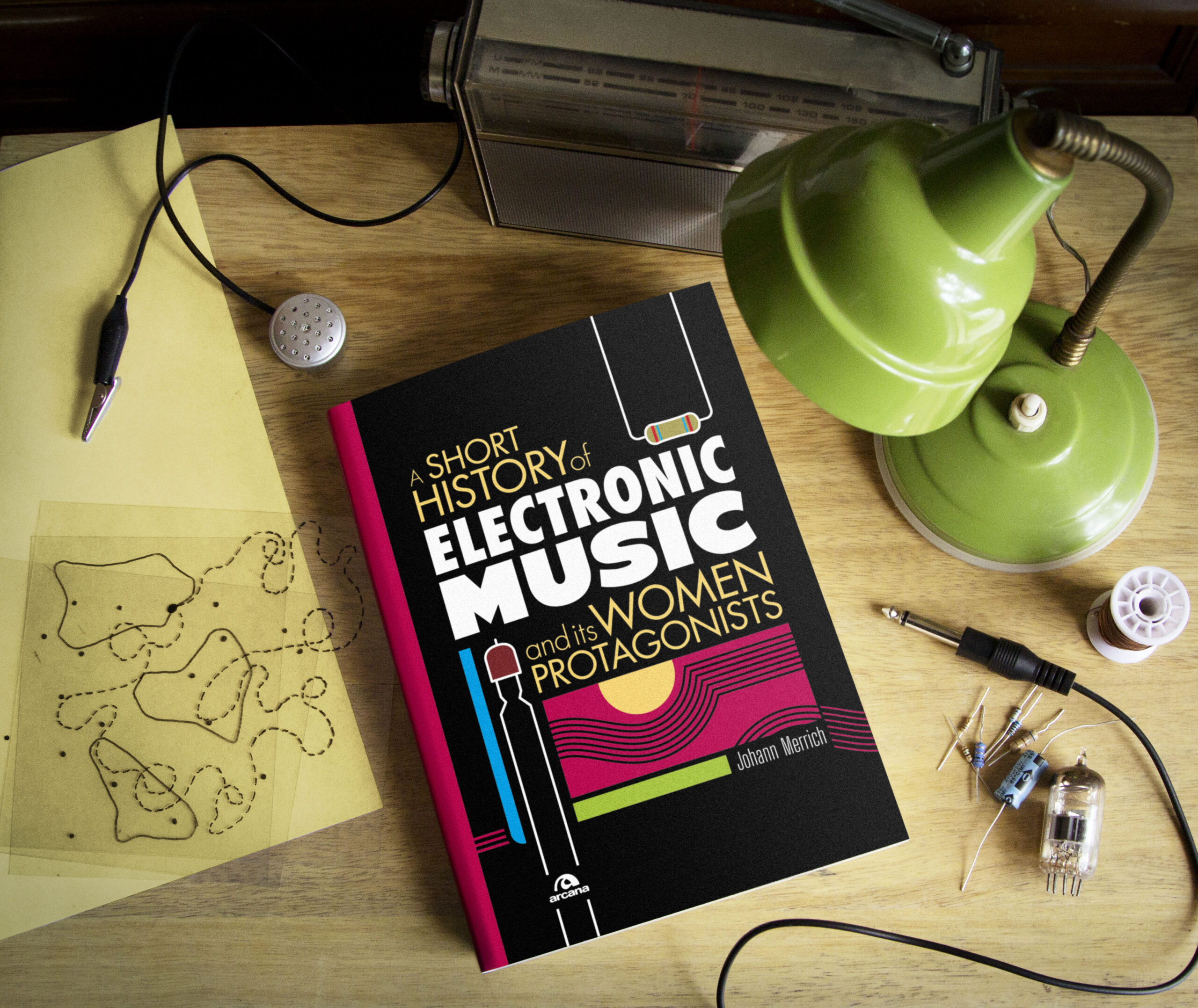
Built from author Johann Merrich’s blog, A Short History of Electronic Music and Its Women Protagonists, presents the technological and philosophical developments of Electronic Music through the stories of those who created them. Originally published in 2019 in Italian, the English version was released this past June. Johann Merrich is an Italian musician and freelance researcher focusing on electronic and experimental music. Her blog, Short Stories focuses on creating an intersectional account of the music she is passionate about. When I received this book to review I was excited, I cannot get enough of stories from audio history, especially one that highlights diversity as does this book. Artists, inventors, benefactors, they all have a part to play in the chronology. Among the names of Leo Theremin, John Cage, and Robert Moog are the names Ciani, Derbyshire, and Carlos. It doesn’t stop there either: layers are peeled further to unearth stories hidden from the public eye, until now. Sisters, wives, and others who had their stories overshadowed by more stereotypical heroes finally receive the spotlight.
It reads more like a nonfiction novel than a textbook. The sections are grouped together by cultural background or by artistic movements. It allows for each character to be introduced by the one preceding, a stream of consciousness that seamlessly follows the evolution of Electronic Music at each stage. Be prepared with a notebook nearby, for this text is a deep dive that features many unappreciated musicians and artists that are worth discovering. It starts with the birth of Experimental and Electronic Music, covering its growth through radio and television before branching off to regional niches such as Japanese, Italian, and even Eastern European. From there it focuses on the fringe and the mainstream before tying the past with the future: computers.
No other book intertwines different movements in Electronic Music with the variety of perspectives that A Short History of Electronic Music and Its Women Protagonists accomplishes. As its title suggests it is a timeline of Electronic Music, focusing on women. It claims to be a new narrative, inclusive and inquisitive, and it succeeds. Because of the care put into researching, no one name stands out as unworthy, each story has its place alongside another. I feel as though I am walking through their studios and concerts, piecing together what is Electronic Music. What a journey it is.

After filming has wrapped, sound effects have been added, the music recorded or licensed, and all cuts and changes have been approved, a movie enters the production stage called picture lock. That’s when the supervising sound editor begins the painstaking process of fashioning a final soundtrack from a film’s many sonic components. These include production sound (the dialogue and ambient noises captured during shooting), foley (reproduced sounds), ADR (automated dialogue replacement), walla (crowd noises), sound effects, and music.
While supervising sound editors may do a certain amount of editing themselves, their primary job is to oversee the work of a full team of dialogue editors, sound effects editors, and music editors, ensuring that post-production sound stays on schedule.
Once the effects and dialogue are pristine and perfectly situated within the film, the supervising sound editor stitches them together with the composer’s score and the music supervisor’s song selections, creating a complete sound experience to accompany the moving picture. The work is done using a DAW (digital audio workstation), which stores all the sounds in separate files and allows the editor to synchronize each one with particular frames in the film. When the sound editor’s job is finished, the completed soundtrack is sent off to a re-recording mixer to be balanced and mastered, a process for which the supervising sound editor is likely to be present.
 Katie is a sound student, recently getting into the realm of audio post-production for film and television at Sheridan College in Oakville, Ontario. She’s heading into her final year of the Honours Bachelor of Film and Television program.
Katie is a sound student, recently getting into the realm of audio post-production for film and television at Sheridan College in Oakville, Ontario. She’s heading into her final year of the Honours Bachelor of Film and Television program.
While Katie has gone through dozens of phases and considered many career paths—singer/songwriter, tattoo artist, pastry chef, makeup artist, comedian, anesthesiologist, and so much more!—she is delighted to have been bitten by the audio bug and is determined to follow this whole thing through to the end, hoping to someday be a Supervising Sound Editor on feature films.
A few assignments during her third year of studies had led Katie to interview several women working professionally in audio. These conversations were so valuable and inspiring to her and they just happened to coincide with the SoundGirls Podcast’s search for new hosts. Katie daydreamed about landing the gig for weeks and is convinced she manifested this reality. Being able to continue the trend of speaking with folks working professionally in audio—and now getting to actually share the wealth in these conversations with people through the podcast—is such a worthwhile endeavor. She feels really blessed and excited to be a part of the SoundGirls community!
 Katy Wood is a freelance sound supervisor and sound editor originally from New Zealand. Her career in sound for film and television has spanned more than 20 years and four countries. She has worked extensively in the United States, New
Katy Wood is a freelance sound supervisor and sound editor originally from New Zealand. Her career in sound for film and television has spanned more than 20 years and four countries. She has worked extensively in the United States, New
Zealand, Australia, and the United Kingdom. Katy has covered all aspects of sound production and post-production on projects ranging from large feature films, such as The Lord of the Rings trilogy, American Sniper, Ant-Man and the Wasp, Just Mercy, and Birds Of Prey to compelling documentaries like Disarm, Girl Rising and No Dress Code Required. She has a Masters Degree in Film and Television Specializing in Sound from the Australian Film Television and Radio School. In addition, Katy has taught courses on sound post-production in Australia, Mexico, the US, and Chile.
 Onnalee was a ballet dancer before getting into audio. Since then, Onnalee has won several Emmys and Cinema Audio Society (CAS) awards for her work as dialog and music mixer on Game of Thrones. The Underground Railroad’s Joi McMillon, Onnalee Blank Featured in THR’s ‘Behind the Screen’ Episode
Onnalee was a ballet dancer before getting into audio. Since then, Onnalee has won several Emmys and Cinema Audio Society (CAS) awards for her work as dialog and music mixer on Game of Thrones. The Underground Railroad’s Joi McMillon, Onnalee Blank Featured in THR’s ‘Behind the Screen’ Episode
 Marla has worked as a sound editor and supervising sound editor for over 20 years in television and film and has worked on over 70 feature and episodic titles. As such she has seen the many changes the industry has gone through. From 24- track tape to the various digital workstations battling to become the industry standard, she’s experienced the evolution to where we are today with pro-tools. She started her career working as part of the production sound team on TV movies. This has proven to be invaluable to her career in post sound.
Marla has worked as a sound editor and supervising sound editor for over 20 years in television and film and has worked on over 70 feature and episodic titles. As such she has seen the many changes the industry has gone through. From 24- track tape to the various digital workstations battling to become the industry standard, she’s experienced the evolution to where we are today with pro-tools. She started her career working as part of the production sound team on TV movies. This has proven to be invaluable to her career in post sound.
She has recently served as the supervising sound editor for the long-running series Scandal and How to Get Away with Murder, as well as the highly acclaimed Showtime limited series Your Honor. Marla has been nominated for two Primetime Emmys for her work on Dead by Sunset and See Jane Run, as well as three MPSE Golden Reel Awards for Jean-Claude Van Johnson, Prep & Landing, and Commander in Chief.
 Lauren was the supervising sound editor on Carnival Row. A multiple Emmy-nominee for sound editing on Daredevil, she has also received several Golden Reel Award nominations from her peers. Aside from Daredevil, she’s well known for her work on Punisher, The Bourne Identity, Gladiator and For Love of the Game.
Lauren was the supervising sound editor on Carnival Row. A multiple Emmy-nominee for sound editing on Daredevil, she has also received several Golden Reel Award nominations from her peers. Aside from Daredevil, she’s well known for her work on Punisher, The Bourne Identity, Gladiator and For Love of the Game.
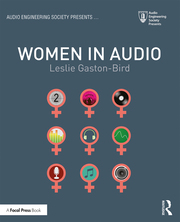
Now that we’re getting back into the swing of things, it might be time to brush up on our audio skills. Lucky for you, I’ve been scoping out some of the best new books—and best of all, they’re all written by women!
 In this easy-to-digest handbook, Leslie Gaston-Bird applies principles from algebra, geometry, trigonometry, and even calculus to concepts such as Ohm’s law, delays, impedance, bandwidth, and decibels. This concise book offers a foundation for connecting mathematics with modern software tools for digital audio. My favorite part about this book is that the author begins by assuring the reader that math does not have to be scary. She provides a section on math anxiety, as well as a brush-up review on basic math. If you’re still not sure if you’re ready for this book, the self-assessment in the introduction will definitely help you make the right decision. Honestly, I’ve been begging the universe for years for a book like this, and we are all so lucky that Leslie Gaston-Bird came through!
In this easy-to-digest handbook, Leslie Gaston-Bird applies principles from algebra, geometry, trigonometry, and even calculus to concepts such as Ohm’s law, delays, impedance, bandwidth, and decibels. This concise book offers a foundation for connecting mathematics with modern software tools for digital audio. My favorite part about this book is that the author begins by assuring the reader that math does not have to be scary. She provides a section on math anxiety, as well as a brush-up review on basic math. If you’re still not sure if you’re ready for this book, the self-assessment in the introduction will definitely help you make the right decision. Honestly, I’ve been begging the universe for years for a book like this, and we are all so lucky that Leslie Gaston-Bird came through!
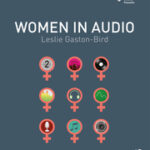 Ok, ok, I couldn’t mention one without mentioning the other, so if you’ve already added Math Fundamentals for Audio to your cart, go ahead and throw in this other gem by Gaston-Bird. This book is packed full of profiles and stories of audio engineers who are women, including a historical view of women and their achievements across various audio professions. The book also breaks down the discussion of trailblazing women in audio by discipline, including radio; sound for film and television; music recording and electronic music; hardware and software design; acoustics; live sound and sound for theater; education; audio for games, virtual reality, augmented reality, and mixed reality, as well as immersive sound. Personally, I keep this book in my Pelican Case and am ready to throw it at anyone who tells me they just can’t find women in this audio industry. 10/10 recommend, for real.
Ok, ok, I couldn’t mention one without mentioning the other, so if you’ve already added Math Fundamentals for Audio to your cart, go ahead and throw in this other gem by Gaston-Bird. This book is packed full of profiles and stories of audio engineers who are women, including a historical view of women and their achievements across various audio professions. The book also breaks down the discussion of trailblazing women in audio by discipline, including radio; sound for film and television; music recording and electronic music; hardware and software design; acoustics; live sound and sound for theater; education; audio for games, virtual reality, augmented reality, and mixed reality, as well as immersive sound. Personally, I keep this book in my Pelican Case and am ready to throw it at anyone who tells me they just can’t find women in this audio industry. 10/10 recommend, for real.
 So, this book, technically, isn’t new, as it was published in 2010, but I just discovered it, so it’s new to me, and I can’t get it out of my head. In 2000, Tara Rodgers, aka Analog Tara, founded the critically acclaimed website, Pinknoises.com, which was meant to promote women in electronic music and make information about music production more accessible to women and girls. Tara would post interviews with women artists that would discuss their personal journeys and work practices. This book became an extension of that incredibly fascinating website and offers new and lengthier interviews, as well as several resources for more exploration into the exciting world of contemporary electronic music. pinknoises.com now redirects to Tara’s website, analogtara.net, and I super recommend checking her and her music out. I promise you’ll thank me.
So, this book, technically, isn’t new, as it was published in 2010, but I just discovered it, so it’s new to me, and I can’t get it out of my head. In 2000, Tara Rodgers, aka Analog Tara, founded the critically acclaimed website, Pinknoises.com, which was meant to promote women in electronic music and make information about music production more accessible to women and girls. Tara would post interviews with women artists that would discuss their personal journeys and work practices. This book became an extension of that incredibly fascinating website and offers new and lengthier interviews, as well as several resources for more exploration into the exciting world of contemporary electronic music. pinknoises.com now redirects to Tara’s website, analogtara.net, and I super recommend checking her and her music out. I promise you’ll thank me.
 I’m calling this one “industry adjacent.” I always get people asking me how they can get their kids or younger students into the field, so I’m always on the hunt for good teaching tools geared toward a younger demographic, and this is definitely a great one. While the focus isn’t audio, specifically, this engineering book for teens introduces major engineering disciplines and covers areas that could come in handy for future audio engineers and sound designers, such as: electrical engineering, software engineering, computer engineering, and acoustical engineering. Either way, I really love a good training book for kids, and getting their brains moving in the direction of engineering just can’t be a bad thing.
I’m calling this one “industry adjacent.” I always get people asking me how they can get their kids or younger students into the field, so I’m always on the hunt for good teaching tools geared toward a younger demographic, and this is definitely a great one. While the focus isn’t audio, specifically, this engineering book for teens introduces major engineering disciplines and covers areas that could come in handy for future audio engineers and sound designers, such as: electrical engineering, software engineering, computer engineering, and acoustical engineering. Either way, I really love a good training book for kids, and getting their brains moving in the direction of engineering just can’t be a bad thing.
 This book is a must-have for those composers thinking about jumping into video game composition. During the pandemic, I wasn’t sure when or if I would ever be able to go back to live theatre and/or concerts, so I started researching other ways to utilize my skills and came across this excellent book. In her books, Winifred Phillips (an award-winning video game composer herself) discusses the very real disconnect between what composers typically learn in school and what necessary creative skills they need to be successful in the video game industry. This information alone feels like a golden ticket to make the transition from classical musicianship to a successful video game composer. Phillips also offers detailed coverage of essential topics, including musicianship and composition experience; immersion; musical themes; music and game genres; workflow; working with a development team; linear music; interactive music, both rendered and generative; audio technology, from mixers and preamps to software; and running a business. My personal feeling is that I need to be as prepared as possible for a full stop in live entertainment employment (now that I know that’s a possibility and could maybe happen again), and this book is definitely an important tool in my arsenal to getting the most out of my music skills.
This book is a must-have for those composers thinking about jumping into video game composition. During the pandemic, I wasn’t sure when or if I would ever be able to go back to live theatre and/or concerts, so I started researching other ways to utilize my skills and came across this excellent book. In her books, Winifred Phillips (an award-winning video game composer herself) discusses the very real disconnect between what composers typically learn in school and what necessary creative skills they need to be successful in the video game industry. This information alone feels like a golden ticket to make the transition from classical musicianship to a successful video game composer. Phillips also offers detailed coverage of essential topics, including musicianship and composition experience; immersion; musical themes; music and game genres; workflow; working with a development team; linear music; interactive music, both rendered and generative; audio technology, from mixers and preamps to software; and running a business. My personal feeling is that I need to be as prepared as possible for a full stop in live entertainment employment (now that I know that’s a possibility and could maybe happen again), and this book is definitely an important tool in my arsenal to getting the most out of my music skills.
The thing that all of these books have in common is their genuine tone of care and thoughtfulness in regard to the reader. It’s what makes them accessible. I find that many education-based materials can sound too technical or “lecturey,” and these books are definitely the opposite, which serves a valuable lesson to us all that being an expert and imparting wisdom does not have to look like the inside of an Ivy League lecture hall. Thanks, ladies, for being straight shooters and still being totally awesome.
SoundGirls Members can borrow audio books from our lending library

Early audio recordings were first printed and played back on reel-to-reel tape. Then DAT tape made an appearance. Compact discs were the next form of recording and distributing audio. Now, aside from rare exceptions, sound designers and audio engineers are working with digital audio files. Modern lighting and sound consoles also store digital files. The luxury of saving shows to a file empowers us to switch from one band’s settings to another faster than you can say, “Check 1, 2.”
There is a downside to this (not so new) digital landscape. Intangible work can make you forgetful about storing backup copies. I must confess that when I was still very green in my career, digital files seemed safer. I learned my lesson the hard way when I was designing sound for a theater production ten years ago. Someone broke into my friend’s car, where my laptop was and stole my computer with all of the sound files on it! I scraped together all of the files from email attachments with my director, but a lot of effects and music had to be recut. Not my proudest moment. Ever since then, everything gets backed up to a drive while I am working, and that drive gets backed up to a cloud. Like many sound professionals, I operate under the convention that if I have one copy of a file, then the file does not exist.
As my experience above illustrates, developing a file redundancy workflow often happens through the hard lesson of losing work. So I’m here to (hopefully) save some readers later pains.
“ I was designing sound for a play. My sessions were all synced to Dropbox. I sat down for tech and opened my laptop, which proceeded to make that awful ‘crunching’ sound of end-of-life. I ran to the Apple Store, bought a new laptop, downloaded LogicPro, and had my show sessions up and running within an hour – in time for tech! Now, all of my document files live on DropBox. Projects live on synched drives, but I’ll still push to DropBox as an extra layer, namely if it’s something that would take me more than 5 minutes to redo.”
— Veronika Vorel, sound designer
“While I was studying Music Production and Technology at the Hartt School of Music, I had a project of recording a band. I asked my musician friends and completed recording the whole song including all instruments and vocals. Then, I tried to back up the work at the end of the day because ‘one file means the file doesn’t exist.’ So I backed it up. BUT, I found out that instead of rewriting from the new one to the old one, I did it opposite… replaced the entire new folder with older folder so I lost all my new work. I even used some programs to mirror the folder and stuff. It wasn’t just dragging and drop. I tried to find a way to save the file but it was all gone… I had to redo all the work the next day. Thank you to all my friends who came back the next day. Ever since then, I have become extra careful about the backup process.”
— Gahyae Ryu, sound designer
“These days, I have gotten into the good habit of backing up projects after every session, both cloud and external. Technology constantly evolves, but technology can also fail, without explanation and at the worst time. But let’s say for example if a theatre director decided that they prefer the sound cue sequence from a previous rehearsal day, I can easily pull that from the archive of multiple backups and save precious production time.
I save every 5-10 minutes because you never know when you can all of a sudden lose power. A worst-case scenario occurred when building cues for a particularly complex sequence in a play. The computer froze, and upon reboot, the progress was not saved. Then the next thing you know, everyone is waiting on you as you redo the building process all over again. You definitely don’t want to find yourself doing that while working on a play like The Curious Incident Of The Dog In The Night-Time.”
— Jess Mandapat, sound designer & composer
“ I have a weird story where I had a backup of my laptop and console files and had my backpack stolen at a gig with my laptop and my backup hard drive and all my console thumb drives all in the backpack. I literally lost everything in one shot. So I learned the hard way that now I carry a thumb drive that stays with my console, a hard drive at home and I keep my backpack with me everywhere I go! “
— Beckie Campbell, front-of-house engineer and owner of B4Media Production.
“Never delete a project until you’ve verified it’s backed up to one (if not two) places. I once deleted a session from my laptop because I assumed it was backed up. Turns out, my nightly backup failed, and I didn’t have it on another computer like I thought I did. Luckily it was just a personal project and I only lost a couple of afternoons of work, but that was nearly 10 years ago, and it still bothers me.”
— April Tucker, re-recording mixer
“I have a good story about when I blanked a console moments AFTER soundcheck, and someone showed me the history feature and bailed me out!”
— Becca Kessin, theatrical sound designer & educator
“There was the time I was designing a play, and the night before tech my FX drive decided to pine for the fjords. No worries…I’ll grab the backup drive. Which…had an empty folder called “FX Backup” where the backup had failed to sync.
I spent that tech texting categories of effects to a generous friend who would quickly copy that category from his library to his webserver to let me download them as needed.”
— Andy Leviss, audio engineer & sound designer
“ I was backing up a ten-hour day’s work of vocal comping and tuning. Fired up the backup drive to make my safety copy when the power went out, flashed on, back off, and then on again five minutes later. A drunk driver had hit a pole in the neighborhood. The power flashed while my drive was spinning and ended up wiping the main drive. Fortunately, the backup was okay, but I lost the entire day’s work. I called the producer, explained what happened, and told him I was going to have a drink and would re-do my work the following day. Bought an uninterrupted power supply first thing the next morning.”
— Josh Newell, audio engineer
“My story about not backing up involves recording to only one media rather than not backing up to a laptop or hard drive. A little over 2 years ago, I’d use my Sound Devices MixPre 6 to record sound for smaller jobs. It’s a great little mixer, which can definitely handle 1 boom and 3 lav mics. The downside about this recorder is that it’s only recording to one media (SD Card). On one shoot, we downloaded mid-day. The DIT tells me that there are no files on my SD card, which I thought was strange because I specifically remembered recording the episodes. Somehow when he put the SD card into the computer, it formatted the card. We both panicked a little. Luckily someone had the program that recovers deleted files off of media, which found all of my original files. In this moment, I realized how important it was to record on more than one media. If I use a MixPre then I like to send the audio out to an external recorder.”
— Kally Williams, production sound mixer
“Recently, I had a project I was working on that required multiple different session files that were slightly different from each other. My backup procedure is to usually keep every file I create in at least three separate places: two are stored on hard drives, and the last is a cloud backup (I currently use Backblaze). After a pretty exhausting workday where I put in a lot of time and energy into a particular project, I went to do my standard end-of-the-day backup where I drag the session onto the extra drive. Except, there was apparently another folder with the same name that I had not changed, and since it was a large session, I copied it over, hit okay, and walked away. When I came back a little while later, I realized that I had just completely overwritten the folder I had worked on all day. Not to worry, right? I could just use the backup from my cloud storage. Only, I had forgotten that I had temporarily disabled it a few days prior as I switched hard drives. Long story short, I lost everything- a full days work, and I was on a deadline. Let this be a reminder; always, always check your cloud backup before you start working, and make sure to back up your data, for reasons just like this one.”
— Christa Giammettei, freelance post-production audio engineer
I have a few stories where backups have saved the day for me. Console backups have been the most needed – twice because of water damage to the console, one of them the day of event for commencement at UCLA where they ran the sprinklers even though we were assured that they were off. Hollywood Sound arrived with new console 2 hours before the event and we were back up and running in about 20 mins after testing everything. At the Hollywood Bowl during the production of Hair in 2014 that Phil Allen designed, we got rained on at a Saturday show and had to replace the console for the Sunday show (which also rained a little). It was a quick switch out of cables, load the file, test and ready to go.
So mostly I have had positive experiences with being glad for backups. I do think there is a generational difference in thinking about backups. Maybe it comes from more experience (time) and have seen things go down over different media (tapes, MD’s, CDs, etc., and writing down console settings from an analog desk). But I see many current students who live their lives with no backups whatsoever and when you bring it up they say things like “I would die if I lost my computer right now” yet continue without a backup plan. It’s so easy to backup these days, there really isn’t an excuse. Drives are cheap, dropbox and google drive are also relatively cheap and the software to clone (CCC or SuperDuper) work elegantly and are rock solid for recovery. It is just a state of mind to get into to start.”
Jonathan Burke, sound designer
Take your pick of external hard drives, thumb drives, and cloud services. There are many ways that are not too expensive to store and back up your work. Even if you start with a smaller hard drive, a couple of thumb drives, and a free Google Drive account it is better than nothing. Invest in even a small file storage system now to save hours (and lots of headache and trust issues) later!
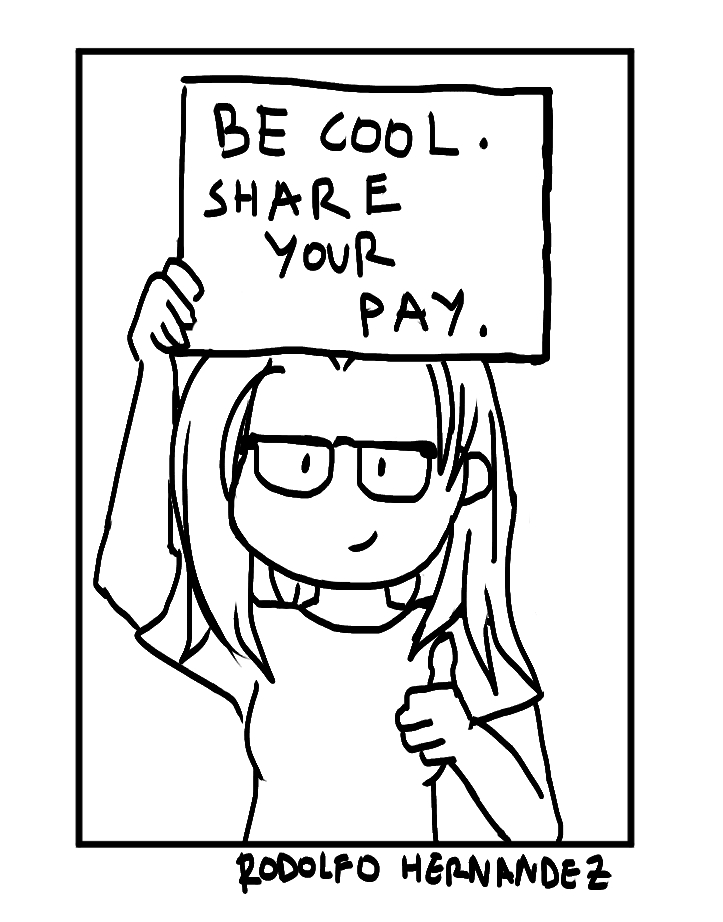
I’ve spent the week trying to help a coworker try to collect pay rates from venues around town so that we can efficiently argue for a raise at our own. A surprisingly large number of our colleagues declined to share any information about their pay at all. Luckily, one was all for pay transparency, and with his help, we were able to fill in most of the gaps we had.
I know that talking about pay has customarily been frowned on, but that needs to change. We can’t effectively make the case for better pay, whether at an individual venue or across the industry if we don’t know what each other are making. Those of us just starting out are more likely to be taken advantage of or lowballed if we don’t really know how to connect our pay to our experience. And, crucially for members of underrepresented demographics like me who are more likely to be underpaid anyway, we can’t see patterns in pay disparity if we don’t know what each other are making.